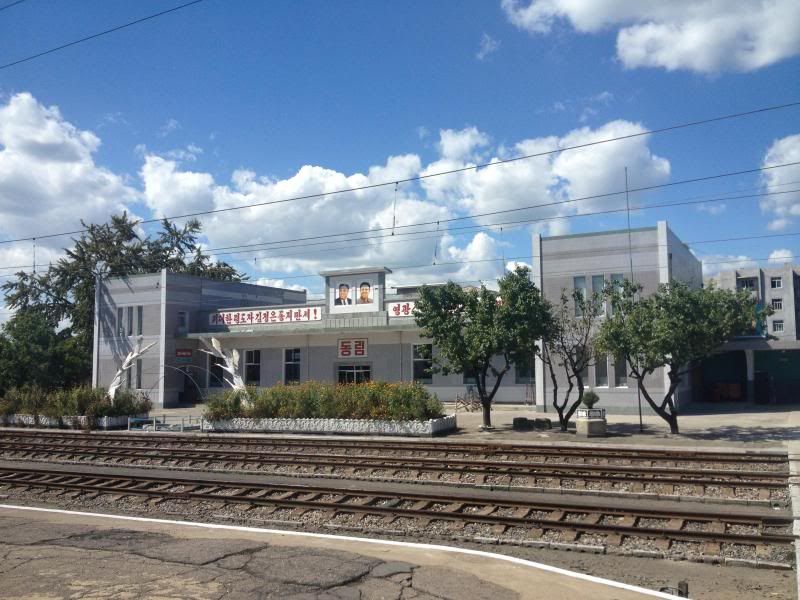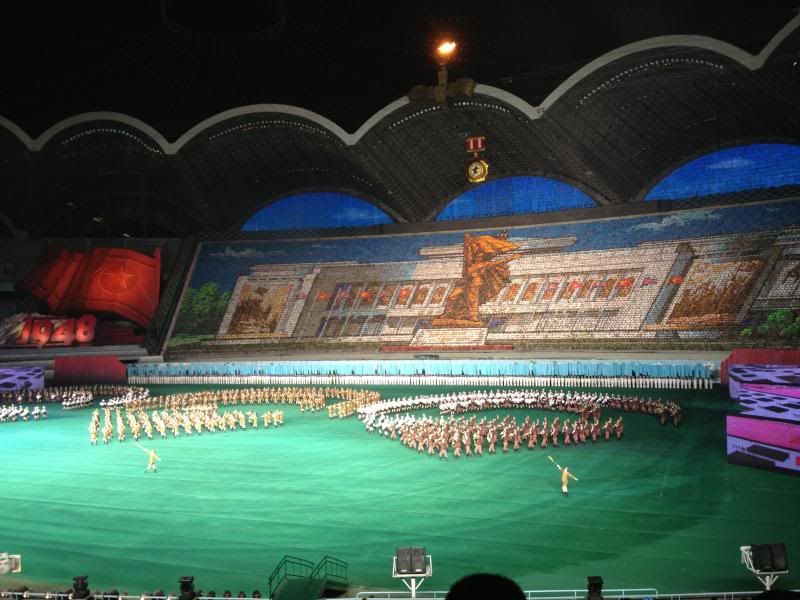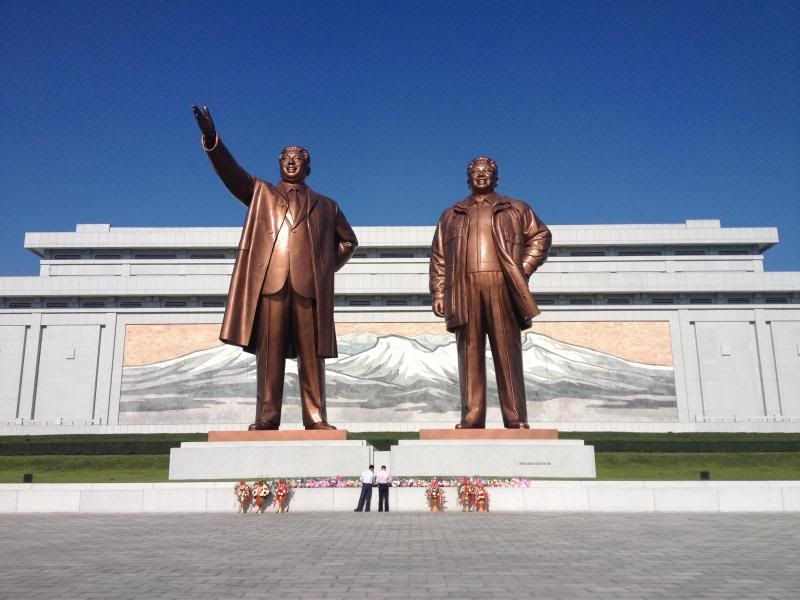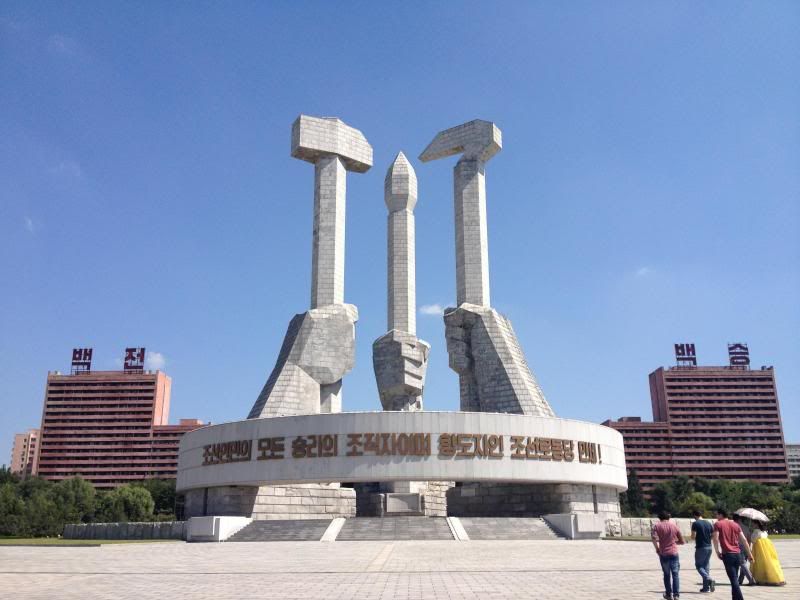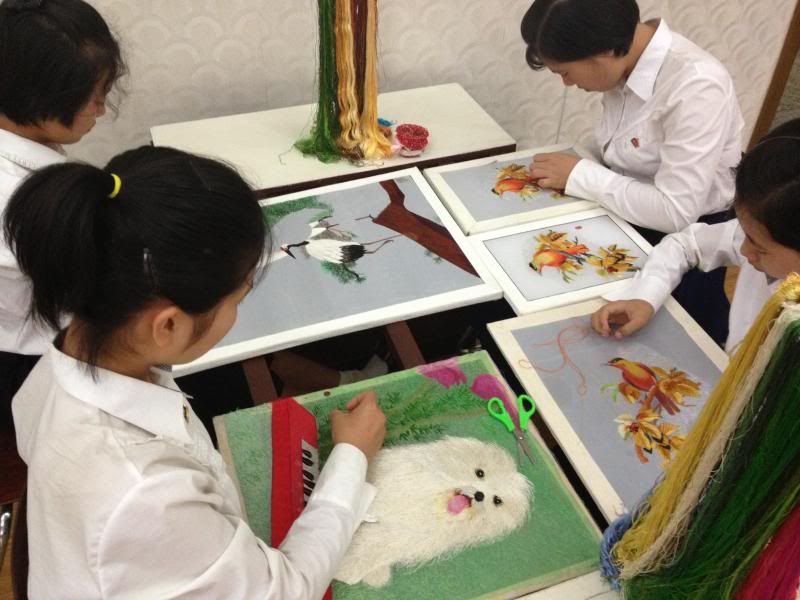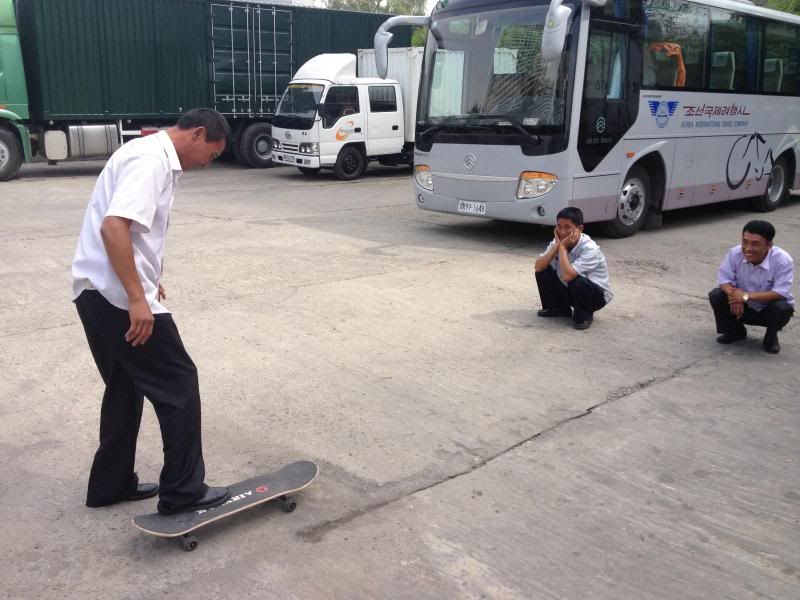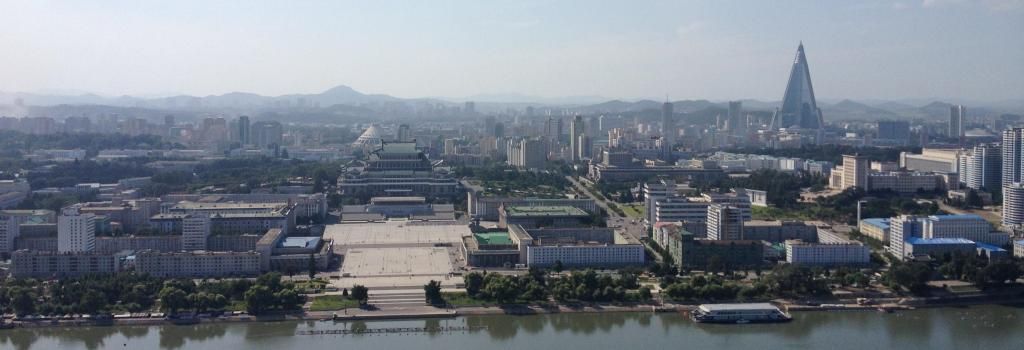Inside Bizarro Korea.
It’s easy to dump on North Korea – officially the Democratic People’s Republic of Korea – what with their self-obsessed leaders and hilarious rhetoric, though these would be fairly superficial reasons to hate on the place. Much has been written about the terrible things that go on within the Hermit Kingdom, and while no tour into the country will ever show the true dark side of life there, it’s when you read between the lines and look beyond the façade that a visit there becomes truly discomforting.
It all starts innocently enough, hopping on a train in Beijing, going through the usual (and loooong) formalities at the border, and then beginning the slow journey to Pyongyang. Passing through lush fields and crops, past concrete train stations adorned with portraits of the Great Leader and Dear Leader, paint peeling and formwork rusting, it could almost pass for any rural Chinese or SE Asian scenery.
And then you notice the lack of cars. That wasn’t entirely weird in and of itself, but specifically it was the lack of old cars. Farming vehicles and trucks tended to be old and well worn, but any time a passenger car was seen it was shiny and new. And for a country that, economically speaking, is not doing great, it was surprising that they mostly appeared to be luxury cars, possibly Mercedes. It was a little hard to tell from the window of the train.
Disembarking the train, we’re whisked away through a bustling central square into our private tour bus, and straight off to the Yanggakdo Hotel, home to the famous and mysterious ‘5th Floor.’ Even from the stairwell it was boarded-up so that was a no-go, but what was interesting was noticing that the majority of the floors we passed as we headed up to our 12th-floor room were unoccupied and without power. On another night when venturing down to the basement containing bowling, karaoke and other entertainment, staff were seen coming out of side doors that led to completely dark rooms. None of this came as a surprise, but it was very telling of their situation.
The next morning came breakfast, a buffet for our group of five, plus another four or five from another group. A variety of foods were on offer, from the standard bread rolls and toast with butter and jam, through to the more traditional soups, kimchi and other pickled goods. It’s here that we receive our first proper taste of the show that is put on for tourists. Everything looks great at first glance, and then you notice that they literally don’t have enough slices of the stale bread to go around, and even less of the butter and jam to go with it. It was a similar story with the rest of the food. On the whole there was enough to feed everyone (even if our hunger was barely satisfied), but considering tourists get treated to the 5-star experience and show of North Korea’s ‘superiority’ and land of plenty, it was weird that it felt like our food was being rationed, too.
Our first two or three days were the beginner’s guide to Pyongyang: Grand People’s Study House, Triumph Arch, Kumsusan Palace (Mausoleum), Mansudae Grand Monuments, even an outing to the Arirang Mass Games. All highly regimented stuff, to the point that if the itinerary said lunch would be from 12-1pm, you better believe we weren’t leaving that restaurant until 1pm. No earlier, no later. Unscheduled stops were an absolute no-can-do, the best case scenario involving our tour guide making arrangements to fulfil requests several days later when appropriate clearance could be received.
Nothing is done on a whim, and certainly never without a minder. For the five of us we had our tour guide, Mr Kim, a secondary-guide-but-kinda-actually-minder-of-Mr-Kim, Ms. Dee, and our bus driver, Mr Lee. Their main job is clear, though their other responsibilities are much more obvious to us than they seem to realise. Their idea of subtlety is, well, not at all subtle. Mr Kim was always trying to listen in on even the most innocuous of conversations and trying to bait us with questions about what we and our government(s) think of North Korea. Ms. Dee was always at the ready with her notepad, constantly jotting notes down next to numbers between 1-5; that there were five guys in our group had to be purely a coincidence! And Mr Lee, he was always pretty chill and nice to us, especially since we kept plying him with smokes. He was apparently the only one that could not understand English. I say apparently, because it wasn’t too long before we started becoming suspicious of anything and everything going on around us.
Separating the reality from potentially poorly drawn conclusions became pretty difficult, mostly because getting a straight answer often proved impossible. There was so much the guides would say that was outright bullshit or just didn’t make any sense, and plenty of documentaries and literature draw their own conclusions such that after a while you don’t really know if you’re just imagining a more sinister background to that steering-wheel tattoo you noticed on a driver’s hand, or the children ‘practising’ art that seemed incredibly similar to those that would appear in all the souvenir stores. Paranoia and scepticism about a lot of things definitely set in.
One of the better-known rumours relating to NK tourism is that they supposedly bug their hotel rooms. Were they really placing bugs in our rooms, the only place we had any privacy from the constantly eavesdropping Mr Lee? I found that a little hard to believe. Would they really dedicate the resources to listening in to what is mostly inane conversation between the thousands of tourists that visit every year? I’m sure more than a few conversations critical of the regime go on behind closed hotel doors, however arrests of tourists are pretty uncommon. Then again, what of the deserted tourist beach we visited? Fenced off from the locals’ beach, we were swimming a good 30+ metres out by ourselves, when three Koreans suddenly appeared from nowhere to swim metres from us, at what was the only point in the whole eight days when we had relative privacy. And then of course, there’s the story of the 6am phone call to our room, asking if anyone was sick on the stomach… it turned out Damien had thrown up in the middle of the night. Thankfully, that one actually had a pretty innocent explanation, although hungover at 6am really isn’t the best time for creepy coincidences. Admittedly though, given these coincidences and the guides’ compulsion to watch and listen in to everything we were doing while in their care, bugged rooms aren’t entirely out of the realm of possibility.
Conspicuously absent from our encounters with most North Korean people were what we dubbed ‘human moments,’ those where they acted like regular people rather than brain-dead robots toeing the official Party line. Genuine opinions, emotions, and moments of friendly interaction were few and far between, which made the time spent there all the more difficult. Thankfully, our quest to skate the recently opened Pyongyang skate park meant we had brought a couple of boards with us, which it turned out became our tools to elicit these rare moments. Mr Kim and Mr Lee were loving the ‘panskates’ and constantly asked us to bring them out whenever there were a few minutes downtime. At one point a passing kid got involved, the smile that lit up across his face even after taking a fall, was my favourite moment from the trip. But that was the other thing we’d notice, adults tended to be very cautious of us (‘imperial bastards,’ and all…) but the kids had that youthful, no political bullshit attitude. We’d be driving along relatively deserted country roads, and every now and then a little kid with a huge smile would enthusiastically wave to our bus as we passed. Maybe this is my own naivety, but I like to think having met the people we did, especially those kids, that they’d come to realise we’re not the assholes that they’re taught to believe.
Every now and then there seems to be a slight glimmer of hope for change over there. The cult of personality revolves heavily around the Kim family, but since Kim Jon Un’s rise to power, it looked like the portraits and statues were ending with his father. These portraits and statues can be found everywhere, but of Kim Jong Un? Nothing. Zip. Zilch. I considered the thought that maybe this guy is ever so slightly less self-obsessed, and possibly a tiny step in the right direction. And that’s when, on our last day, we’re taken to the recently opened Korean War museum – the one that corrects all the propagandistic misinformation [sarcasm, people] spread by the allied forces – a magnificently opulent, palace-like complex. A pair of gigantic and massive doors flank the entrance, opening up to grand marble staircases and, straight ahead, there stands a 20-foot statue of none other than old mate Supreme Leader, Mr Kim Jong Un. So much for change…
I couldn’t make up the complete and utter weirdness of the whole thing if I tried. For a trip that was 2+ years in the planning, we’d researched and read virtually every possible resource before arriving, and we thought we knew what we were getting ourselves in for. For the most part, we got everything we expected and wanted to see: facades, bad excuses, inflexible touring, limited freedoms etc. What was wholly unexpected was the mental toll it would take. Not being able to have a simple conversation, to leave the hotel and go for a walk, to decide to spend a little more or a little less time somewhere; I’ve never felt so stripped of personal liberties. On returning to Beijing one of the boys commented on the absurdity of reaching China, and his first thought being ‘Ah, freedom!’ but that was honestly the feeling. I’d never been so relieved to have finally left a country.
The ridiculous part is that’s the extremely in-a-nutshell account of what happened. There are plenty more stories, many I’ve touched on here barely even scratch the surface. Who is Mr David, and why does he have 2 passports?? What was the perfectly reasonable excuse for why we couldn’t swim in a pool? Did a hilarious misunderstanding of Damian’s egg allergy land him in a North Korean hospital with anaphylactic shock? Why does Mr Lee get mad at us because of his own tardiness? (No, seriously, why did he?) Does the Chollima have wings? How did Mr David almost land himself in forced labour? Check later to find out, the answers will shock and amaze.
